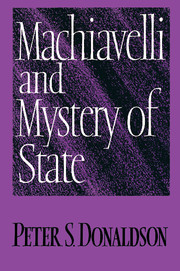Book contents
- Frontmatter
- Contents
- Preface
- 1 Machiavelli and Antichrist: prophetic typology in Reginald Pole's De Unitate and Apologia ad Carolum Quintum
- 2 Bishop Gardiner, Machiavellian
- 3 John Wolfe, Machiavelli, and the republican arcana in sixteenth-century England
- 4 Machiavelli and the arcana imperii
- 5 Gabriel Naudé: magic and Machiavelli
- 6 Biblical Machiavellism: Louis Machon's Apologie pour Machiavel
- Index
3 - John Wolfe, Machiavelli, and the republican arcana in sixteenth-century England
Published online by Cambridge University Press: 06 July 2010
- Frontmatter
- Contents
- Preface
- 1 Machiavelli and Antichrist: prophetic typology in Reginald Pole's De Unitate and Apologia ad Carolum Quintum
- 2 Bishop Gardiner, Machiavellian
- 3 John Wolfe, Machiavelli, and the republican arcana in sixteenth-century England
- 4 Machiavelli and the arcana imperii
- 5 Gabriel Naudé: magic and Machiavelli
- 6 Biblical Machiavellism: Louis Machon's Apologie pour Machiavel
- Index
Summary
The association of Machiavelli with the myth of the arcana imperii, or mysteries of state, belongs, on one level, to the history of political thought and is part of the story of how Machiavelli's ideas were received, transformed, and restated. On another level, it belongs to the history of political discourse, more broadly conceived, and concerns the ways in which attempts to use or oppose Machiavelli's ideas altered patterns in the production of political texts and restructured roles in that production. To read Machiavelli as if he dealt with the arcana imperii entailed changes in the meaning of what it was to write and publish a political text, changes in how authors of such texts thought of themselves, their activity, and their audience. Texts in this tradition are not merely about the arcana: Very often they are arcana, secret or private works meant to be kept from public view. These texts, following Machiavelli, counsel rulers to dissimulate their intentions and conceal the modes by which they exercise their power, and the writers of these texts often conceal their own relation to their work, their intentions, and their sources. Machiavellian authorship participates in the occultation it describes. The Machiavellian arcana of William Thomas and Stephen Gardiner illustrate this principle, and the political writings of Reginald Pole offer a more complex instance, in which an anti-Machiavellian becomes a purveyor of counter-arcana, creating his own partly secret text, and endowing it with a numinous, prophetic authority to counter the satanic power of the Machiavellian mysterium.
- Type
- Chapter
- Information
- Machiavelli and Mystery of State , pp. 86 - 110Publisher: Cambridge University PressPrint publication year: 1989



